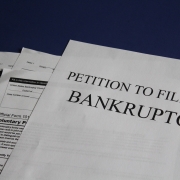Bankruptcy and Divorce in Maryland
Family financial strife clearly impacts marital harmony, and loss of family harmony can have implications for the family finances. Couples fight about money, and unhappiness can lead to spending money to fill a void. When a marriage is nearing its end, debt of either or both spouses can also have reached a tipping point where protective legal measures are necessary. But which comes first? Divorce law and bankruptcy law both impact the personal and marital assets, debts and finances of a couple, and the interrelationship can be complex and confusing. Here are a few important points to consider.
Timing Between Divorce and Bankruptcy is Situation Specific
There is no one rule for which to file first – divorce or bankruptcy. Instead, there are a variety of considerations. For example, who is filing? Is it one spouse, both spouses as a couple or both spouses for separate debt? The cost of a bankruptcy can be lowered if a couple agrees to wait to divorce until they have filed a joint bankruptcy petition and resolved their collective debt together. However, if one of the spouses qualifies for full discharge under Chapter 7, and the other spouse does not because of the “means test”, then it might make sense to wait until after the divorce or the parties are separated to file a petition in bankruptcy. On the other hand, the joint titling of assets as husband and wife may allow for dramatically greater protection of assets when only one spouse files bankruptcy while married. As a result, substantial equity in a jointly owned home may be protected if only one spouse files for bankruptcy before the divorce decree is entered.
Another consideration is urgency. Are there creditors pursuing collections efforts including legal action or foreclosure? They may not be willing to wait until a divorce is finalized, and an immediate bankruptcy petition will trigger an automatic stay on all the creditor’s actions. This will help protect both separate and jointly owned assets. On the other hand, existing debt can reduce alimony obligations, so it may make sense for a spouse to hold off until the divorce has been finalized before getting the debt discharged.
The goal in deciding the sequence should be the preservation of as many assets as possible, so careful review of assets and debts needs to happen before deciding. Understanding the rules in both bankruptcy and family court with respect to ownership interests and allocation of assets and liabilities will help guide the decision.
Bankruptcy Won’t Discharge Support Obligations
Once a divorce decree is entered, awarding support for children and/or alimony for the other spouse, bankruptcy cannot be used to get out from under these obligations. As creditors of the debtor, spouses, and children get preferential treatment in bankruptcy. In fact, while other creditors may have to wait until the bankruptcy process is complete to figure out if and when they might get paid, spouses can go ahead with some aspects of divorce proceedings in state family court, although the treatment of the automatic stay of bankruptcy varies from county to county in Maryland.
The Role of the Former Spouse in a Bankruptcy
If a couple has divorced, there is a high likelihood of acrimony between them if the divorce was a prolonged, stressful process. This may lead a former spouse to intervene in a debtor’s bankruptcy to speak to the debtor’s character, their possible wrongdoing, or identify assets and obligations that the debtor has failed to report. This impulse is not necessarily a good idea. As we noted above, the debtor’s support obligations cannot be discharged in bankruptcy, any move to increase the debtor’s debts, minimize their assets or possibly prevent the resolution of the bankruptcy through a discharge or a plan will only interfere with the debtor’s ability to meet their support obligations.
However, the non-filing former spouse should still be alert. While support obligations are not dischargeable in bankruptcy, property claims, such as a monetary award can be discharged in Chapter 13 bankruptcies, but not in Chapter 7 bankruptcies. Additionally, if a couple had a joint credit card and either spouse files bankruptcy, the non-filing spouse may find themselves pursued by the credit card company notwithstanding a divorce agreement to the contrary. So, a former spouse should be attentive to the proceedings of an ex filing a petition for bankruptcy, particularly given the fact that deadlines for creditors to assert their rights come to pass quickly.
Debt and family strife are both enormously stressful situations. Resolving these issues through the mechanisms of divorce and bankruptcy can be the right course of action. However, given the complexity of both areas of law, it is important to understand how your particular circumstances can impact the outcome of the proceedings. Contact Barkley & Kennedy for a consultation on your best course of action.
DISCLAIMER. The material contained on this Website is not offered, nor should it be construed, as legal advice. The material on our Website has been prepared and published for informational purposes only. You should not act or rely upon information contained in these materials without specifically seeking professional legal advice.













